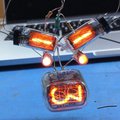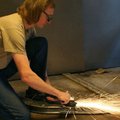Nathaniel Evry will host the Hack Chat on Wednesday, June 21 at noon Pacific.
Time zones got you down? Try our handy time zone converter.
Building a satellite and putting it in orbit was until very recently something only a nation had the resources to accomplish, and even then only a select few. Oh sure, there were a few amateur satellites that somehow managed to get built on a shoestring budget and hitch a ride into space, and while their stories are deservedly the stuff of legends, satellite construction took a very long time to be democratized.
Fast forward a half-dozen or so decades, and things have changed dramatically. Satellite launches are still complex affairs -- it's still rocket science, after all -- but the advent of the CubeSat format and the increased tempo of launches, both national and commercial, has pushed the barriers to private, low-budget launches way, way down. So much so, in fact, that the phrase "space startup" is no longer something to snicker about.
One such group of space entrepreneurs is Quub, Inc., a small company in Lancaster, Pennsylvania which is looking to build and fly a constellation of microsatellites to monitor Earth's environment in real-time. They're building sats and signing launch deals, using consumer-grade technology and modularized construction, and we're lucky enough to have Nathaniel Evry, their Chief Research Officer, stop by the Hack Chat. If you've ever wondered what it takes to build hardware that can stand the rigors of launch and then perform a task in space, you'll want to tune in for this one.












